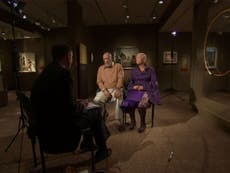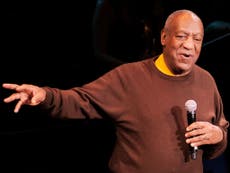Obama, Miliband and Bill Cosby: expect the worst from those who offer to be the best
It's one dashed hope after another

Thought for the day: everyone disappoints you in the end. The only question is how quickly that end comes. I held out against Obama-fatigue for one whole term of his office – easy to do from this side of the Atlantic, I grant you – but his public response to the killings in a Jerusalem synagogue earlier this week finally convinced me he had become a disappointment even to himself.
However intractable the politics of the Middle East, however weary you might be with all parties – which is not to sanction Baroness Warsi’s gross assumption of equivalence between Jews visiting a holy site and terrorists carrying out a massacre – it still behoves a President of the United States at least to try imitating a man who gives a damn. But it’s evident he’s had it up to here with Jews, Muslims and just about anybody else intruding on his elegant aloofness. So that’s goodnight from him, and our only interest in his office now is who will fill it next.
Of Baroness Warsi it cannot be said she disappoints, since to disappoint expectation you must first excite it, but I confess to having harboured hopes of Ed Miliband when he first became Labour leader. OK, he was the son of an ideologue, which has to be a hindrance whatever the ideology, but he did do away with his brother and that, while it isn’t quite the same as doing away with your father, is the next best thing. I liked his air of being newborn, the way he looked into the camera as though he knew diffidence was a virtue, and the impression he gave of being a man of principle. As a matter of fact I still think of him as a man of principle, it’s just that the principle he’s a man of is not his own.
Gone the pellucid, brown-eyed, slightly startled stare, now he’s more often to be seen peering darkly into his troubled conscience and, I fancy, not liking what he finds there. His prevarications around his Jewishness – first imagining loyalty to anything to be a vote-winner, then abandoning it in a bacon sandwich which he wasn’t even sufficiently sincere in his apostasy to eat with relish – left him with few friends on either side of the religious divide, and sauce on his chin. As for the class war he has recently espoused – feudal lords in high-walled mansions versus starving multitudes in draughty council flats unable to afford transport to A&E – it convinces him, in my view, not at all. That God, he knows, has failed. As so, any minute now, will he.
And now accusations of serious sexual misconduct threaten the reputation for wholesomeness enjoyed for so long by Bill Cosby, comedian, educator, role model and family man. I don’t recall ever having an attitude to him one way or another, but it’s a risk making any man an exemplar of family values, just as it’s a risk making him an exemplar of selfless religious dedication or caringness. Such expectations exceed our limits, even where we don’t turn out to be rapists and paedophiles. We are but men. Idealise no one is the only answer. Expect the worst from those who offer to be the best. Better still, jump ship before disappointment has time to trip you up. Invest early enthusiasm, if you must, but don’t hang around for the aftermath. Really like your inaugural speech, Obama; now let that be the last we hear from you.
And it isn’t only people who disappoint. Last week, I was in Germany on a book tour in the course of which I went down with a bad case of post-Heidelberg tristesse. Heidelberg has been important to me since I was about 14 when I first saw the movie of The Student Prince at the Greenhill Cinema in Cheetham Hill, Manchester, in the company of a girl who wouldn’t let me hold her hand but who kissed my cheek when the film was over because she could see how moved I was.
I say when I “first” saw The Student Prince because I was to see it many more times throughout my adolescent years, and I can still conjure Mario Lanza singing “Summertime in Heidelberg” with Ann Blyth – for me, in those days, the nonpareil of womanly sweetness – simply by closing my eyes. That way too I don’t have to be reminded that Lanza wasn’t in the film in person, having grown too fat on American breakfasts. That’s how you eat a bacon sandwich, Ed.
It’s a hopeless love story, hence my tears. She pulls the pints at the university biergarten, he is the son of the King of Karlsburg, and although that sounds like a relationship made in beery heaven, once his father dies he has to leave her. A king cannot marry a commoner and that’s that. Not a social structuring of which Miliband would approve, but then that’s why there’s never been a good operetta made about the British Labour Party.
Why in particular this story touched me deeply – since I was free to marry all the commoners I pleased – I have never fully understood. Perhaps the frothing barmaid was really my mother, and the prince was me at whatever age I was weaned. Or it just might have been that I revered Mario Lanza’s voice, couldn’t wait to go to university and join a fencing fraternity, and loved the way Heidelberg looked in CinemaScope.
I should have left it at that. But no, more than half a century on, I had to go to Heidelberg and find the locations where I had imaginatively lost my heart. And were they there? Of course not. No Ann Blyth in a beer garden, no students marching through the streets singing “Gaudeamus Igitur”, no voice of Mario Lanza floating over the River Neckar. Just a pleasantly picturesque town with a castle at one end and a railway station at the other. Still, nobody mugged me.
Which is more than those who looked up to Miliband and Obama can say.




Join our commenting forum
Join thought-provoking conversations, follow other Independent readers and see their replies